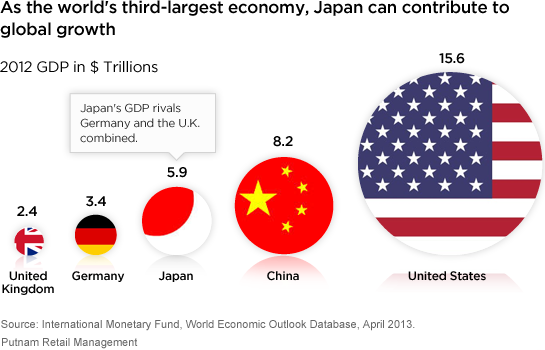While we find U.S. equities attractive, Japan has become a more interesting market, mainly because of the broad political support for the new prime minister, Shinzo Abe. To get Japan out of its deflationary spiral, Abe has pushed forward a number of new monetary and fiscal policies. Both the yen and the Japanese stock market have responded. Stocks have rallied while the yen has fallen in value, making Japanese exports more competitive.
The Abe government has installed new central bank governors to depart from the traditions of the Bank of Japan by stimulating the economy through a powerful dose of monetary easing. The measures are both quantitative, to expand the Bank's balance sheet, and qualitative, to change the mix of securities it owns. It is a challenge to implement these policies effectively, and we are monitoring the progress.
Also encouraging is that the Bank of Japan's efforts are not occurring in a vacuum. The Abe government is easing fiscal policy and introducing a series of structural reforms, which may ultimately be most important for creating sustained economic momentum.

After many years of economic dormancy, Japan was beginning to recover in recent years until the 2011 Fukushima earthquake halted its progress and reverberated in manufacturing supply chains around the globe. But with this new positive direction, Japan could be restored as a contributor to global growth.
For informational purposes only. Not an investment recommendation.
This material is provided for limited purposes. It is not intended as an offer or solicitation for the purchase or sale of any financial instrument, or any Putnam product or strategy. References to specific asset classes and financial markets are for illustrative purposes only and are not intended to be, and should not be interpreted as, recommendations or investment advice. The opinions expressed in this article represent the current, good-faith views of the author(s) at the time of publication. The views are provided for informational purposes only and are subject to change. This material does not take into account any investor’s particular investment objectives, strategies, tax status, or investment horizon. Investors should consult a financial advisor for advice suited to their individual financial needs. Putnam Investments cannot guarantee the accuracy or completeness of any statements or data contained in the article. Predictions, opinions, and other information contained in this article are subject to change. Any forward-looking statements speak only as of the date they are made, and Putnam assumes no duty to update them. Forward-looking statements are subject to numerous assumptions, risks, and uncertainties. Actual results could differ materially from those anticipated. Past performance is not a guarantee of future results. As with any investment, there is a potential for profit as well as the possibility of loss.
Diversification does not guarantee a profit or ensure against loss. It is possible to lose money in a diversified portfolio.
Consider these risks before investing: International investing involves certain risks, such as currency fluctuations, economic instability, and political developments. Investments in small and/or midsize companies increase the risk of greater price fluctuations. Bond investments are subject to interest-rate risk, which means the prices of the fund’s bond investments are likely to fall if interest rates rise. Bond investments also are subject to credit risk, which is the risk that the issuer of the bond may default on payment of interest or principal. Interest-rate risk is generally greater for longer-term bonds, and credit risk is generally greater for below-investment-grade bonds, which may be considered speculative. Unlike bonds, funds that invest in bonds have ongoing fees and expenses. Lower-rated bonds may offer higher yields in return for more risk. Funds that invest in government securities are not guaranteed. Mortgage-backed securities are subject to prepayment risk. Commodities involve the risks of changes in market, political, regulatory, and natural conditions. You can lose money by investing in a mutual fund.
Putnam Retail Management.



